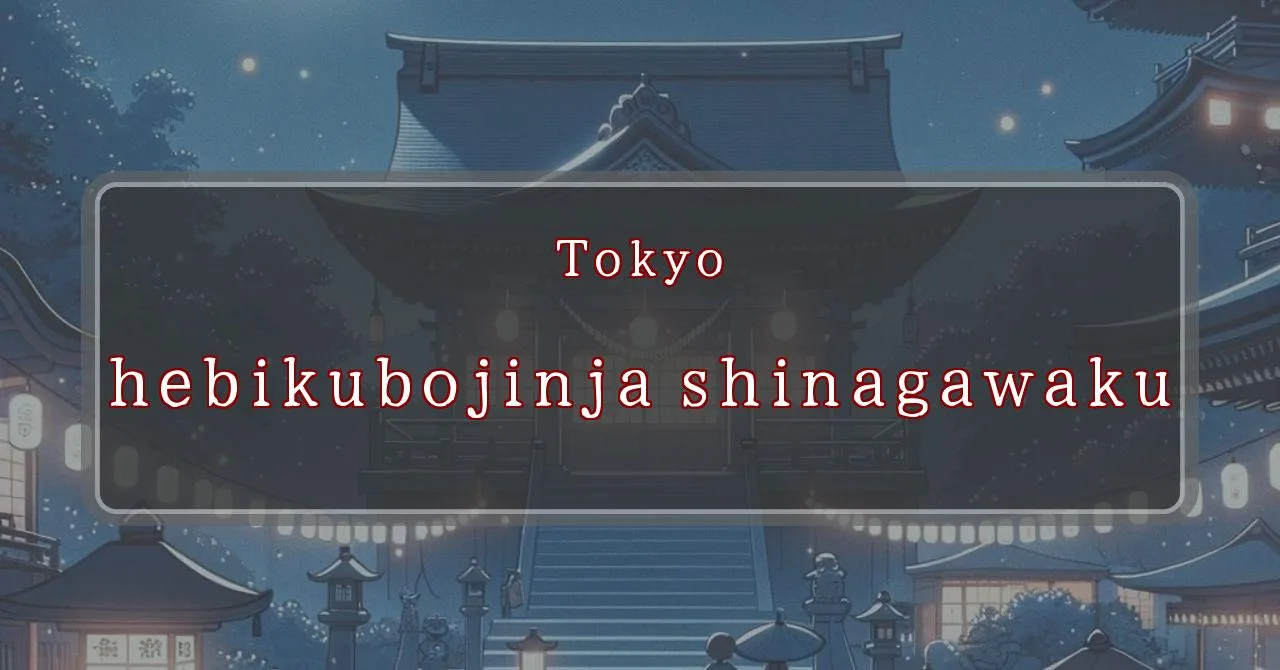Snakekubo Shrine: Where Legends and Festivities Entwine
Basic Information
Hebikubo Shrine is a Shinto shrine located in Shinagawa, Tokyo, Japan. It is dedicated to the gods Amaterasu Omikami, Ameno Koyane no Mikoto, and Ojin Tenno.
- Address: 4-4-12 Futaba, Shinagawa-ku, Tokyo 142-0043
- Phone Number: 03-3782-1711
- Access: 5-minute walk from Nakanobu Station on the Toei Asakusa Line, 6-minute walk from Nakanobu Station on the Tokyu Oimachi Line, 8-minute walk from Nishi-Ooi Station on the JR Yokosuka Line
- Festival Days: September 15th (Fri), 16th (Sat), and 17th (Sun), 2024
Main Events and Attractions of the Festival
The Hebikubo Shrine Festival is a three-day festival held annually in September. The festival features a variety of events and attractions, including:
Mikoshi Procession
On the first day of the festival, a mikoshi (portable shrine) procession takes place. The mikoshi is carried through the streets of Shinagawa by a team of people, accompanied by music and dancing.
Stage Performances
Throughout the festival, there are a variety of stage performances, including traditional Japanese music and dance, as well as modern pop music and dance.
Food Stalls
There are also a variety of food stalls at the festival, selling a variety of Japanese and international dishes.
Fireworks Display
On the final day of the festival, there is a fireworks display over the Shinagawa Canal.
Other Attractions
- A petting zoo
- A haunted house
- A Ferris wheel
- A variety of games and rides
The Hebikubo Shrine Festival is a popular event that attracts people from all over Tokyo. It is a great opportunity to experience Japanese culture and traditions.
Blessings and Deities
Hebikubo Shrine is dedicated to the gods Amaterasu Omikami, Ameno Koyane no Mikoane no Mikoto is the god of wind and rain, and Ojin Tenno is the god of war and agriculture.
- Amaterasu Omikami: Goddess of the sun and the most important deity in Shinto
- Ameno Koyane no Mikoto: God of wind and rain
- Ojin Tenno: God of war and agriculture
Origin and History
The origins of Hebikubo Shrine are unclear, but it is believed to have been founded in the Kamakura period (1185-1333). The shrine was originally called Shinmei Shrine, but it was renamed to Hebikubo Shrine in 1926.
- Founded in the Kamakura period (1185-1333)
- Originally called Shinmei Shrine
- Renamed to Hebikubo Shrine in 1926
Tips and Notes for Visitors
Here are some tips and notes for visitors to Hebikubo Shrine:
- The shrine is open from 9:00 AM to 5:00 PM every day.
- Admission is free.
- There is a small parking lot available for visitors.
- The shrine is a popular spot for weddings and other ceremonies.
- There are several restaurants and shops in the area surrounding the shrine.
Parking Information
There is a small parking lot available for visitors to Hebikubo Shrine. The parking lot is located on the north side of the shrine, next to the main entrance.
- Location: North side of the shrine, next to the main entrance
- Number of spaces: Limited
- Fees: Free
Popular Stalls and Food Carts in Recent Years
| Type of Stall | Description |
|---|---|
| Takoyaki | A staple at Japanese festivals. Characterized by a crispy outside and a creamy inside. |
| Jaga Butter | A simple yet popular snack of hot potatoes lavishly topped with melted butter. |
| Baby Castella | Small castella cakes, sweet and fluffy treats enjoyed by children and adults alike. |
| Grilled Ayu with Salt | Fresh ayu fish grilled whole with salt, a savory taste of Japanese summer. |
| Shaapin | A unique gourmet item influenced by foreign cuisine, with a chewy skin wrapping the filling. |
| Okonomiyaki | A Japanese grilled dish where you often choose your own ingredients for a personalized flavor. |
| Cotton Candy | A fluffy, sweet snack that’s extremely popular with children. |
| Chocolate Banana | A banana coated in chocolate, a fun and visually appealing dessert. |
| Kushiyaki | Various types of ingredients skewered and grilled, an easy-to-enjoy snack. |
| Yakisoba | Fried noodles mixed with a special sauce, a fast food favorite in Japan. |



